Ethics and Professional Advice in Financial Advice: FPC002B Report
VerifiedAdded on 2022/11/14
|17
|4478
|2
Report
AI Summary
This report delves into the ethical considerations within the realm of financial advice, focusing on a case study involving a financial advisor, Sam, and her client, Kelly. The report identifies ethical issues, such as rationalization and implicit bias, that can impede sound decision-making. It analyzes Sam's actions in light of the FASEA Code of Ethics, highlighting areas of non-compliance with standards related to best interests, informed client consent, and professional expertise. Furthermore, the report offers recommendations to Sam on how to improve her approach and communication with Kelly, emphasizing the importance of avoiding assumptions, educating the client, and acting in their best interests. The report also addresses ethical frameworks, potential barriers to ethical decision-making, and the application of FASEA Code standards in various scenarios, including the provision of advice on Austudy benefits and the assessment of risk tolerance. Overall, the report underscores the significance of ethical conduct and professional responsibility in the financial advice industry.
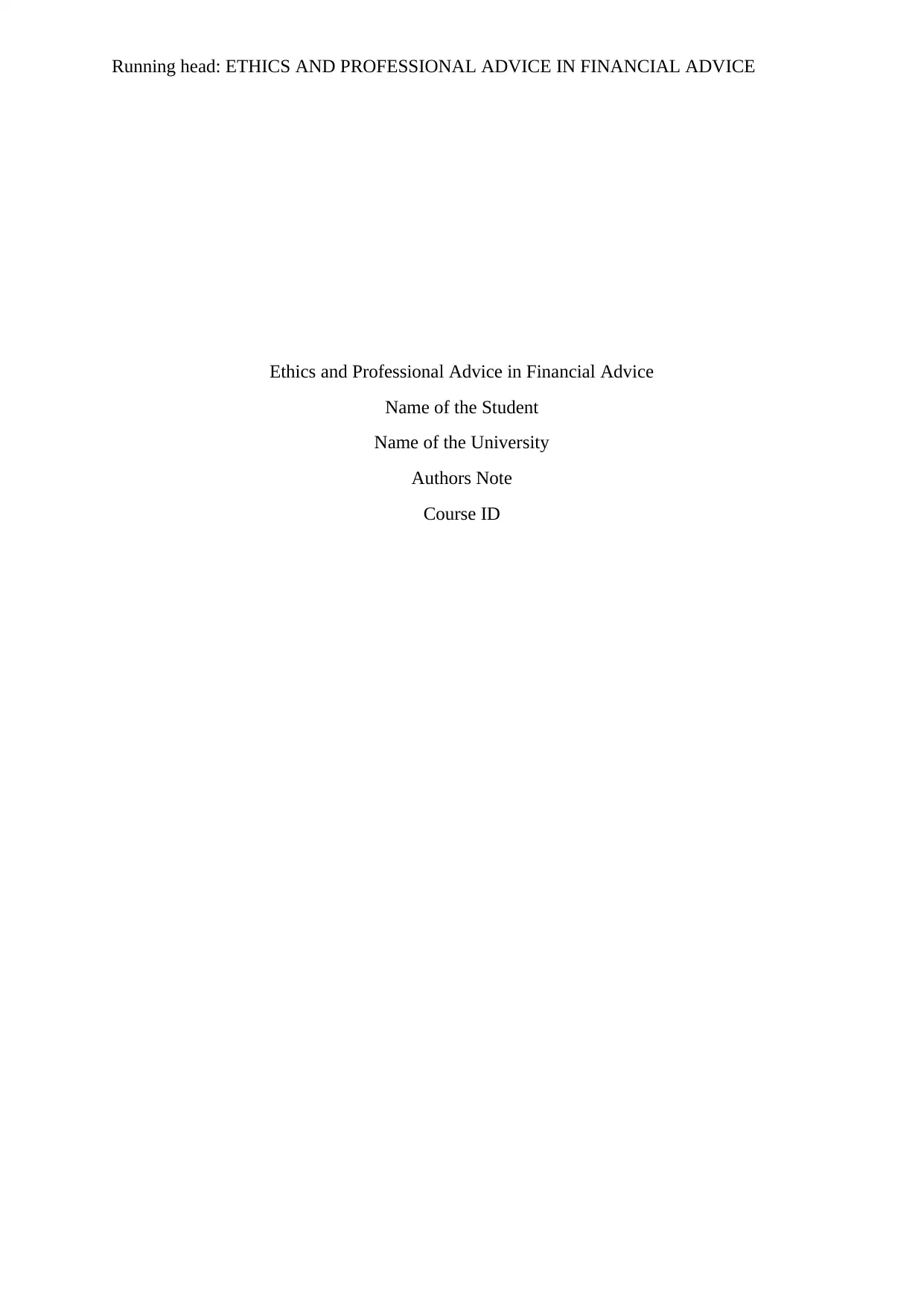
Running head: ETHICS AND PROFESSIONAL ADVICE IN FINANCIAL ADVICE
Ethics and Professional Advice in Financial Advice
Name of the Student
Name of the University
Authors Note
Course ID
Ethics and Professional Advice in Financial Advice
Name of the Student
Name of the University
Authors Note
Course ID
Paraphrase This Document
Need a fresh take? Get an instant paraphrase of this document with our AI Paraphraser
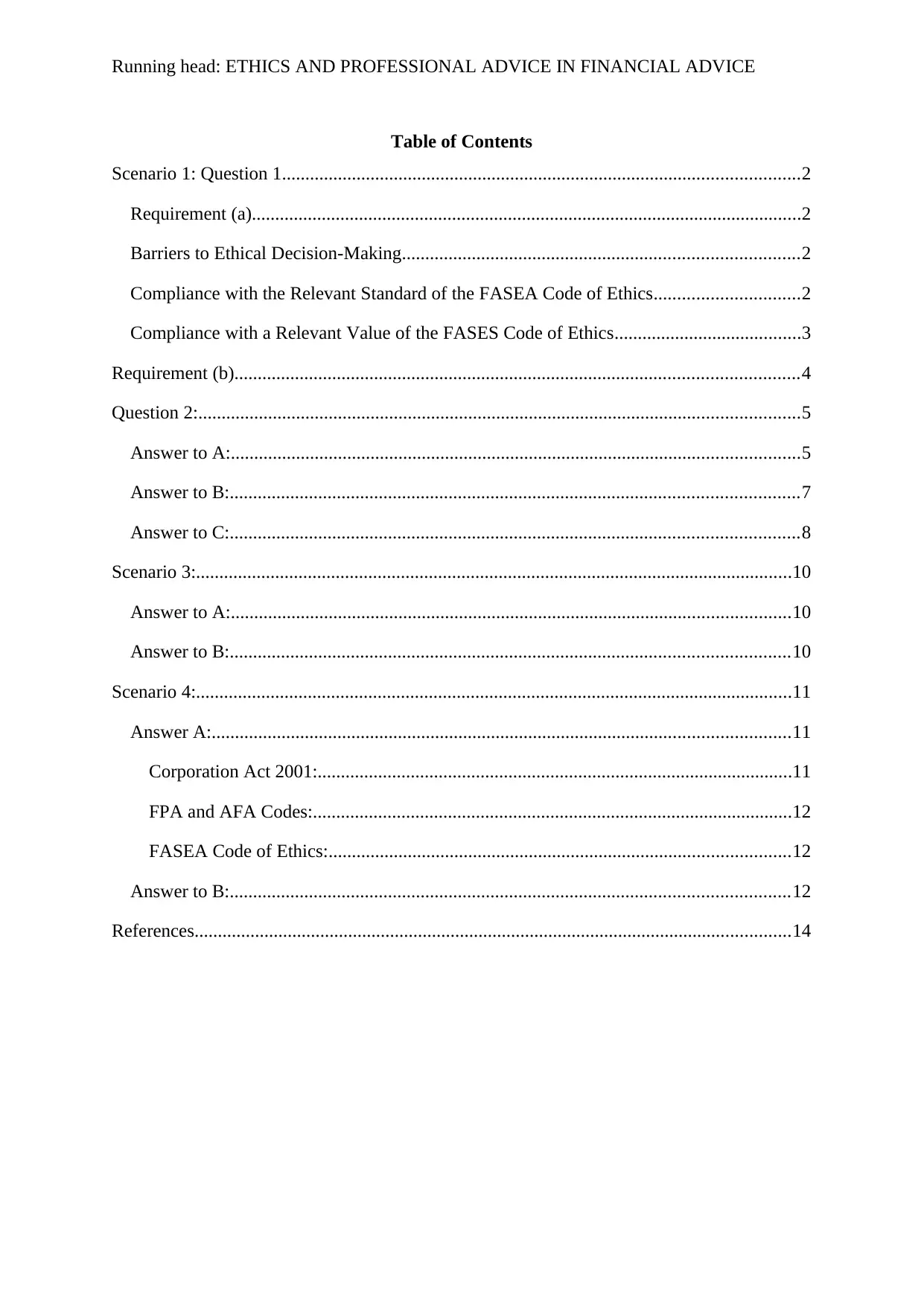
Running head: ETHICS AND PROFESSIONAL ADVICE IN FINANCIAL ADVICE
Table of Contents
Scenario 1: Question 1...............................................................................................................2
Requirement (a)......................................................................................................................2
Barriers to Ethical Decision-Making.....................................................................................2
Compliance with the Relevant Standard of the FASEA Code of Ethics...............................2
Compliance with a Relevant Value of the FASES Code of Ethics........................................3
Requirement (b).........................................................................................................................4
Question 2:.................................................................................................................................5
Answer to A:..........................................................................................................................5
Answer to B:..........................................................................................................................7
Answer to C:..........................................................................................................................8
Scenario 3:................................................................................................................................10
Answer to A:........................................................................................................................10
Answer to B:........................................................................................................................10
Scenario 4:................................................................................................................................11
Answer A:............................................................................................................................11
Corporation Act 2001:......................................................................................................11
FPA and AFA Codes:.......................................................................................................12
FASEA Code of Ethics:...................................................................................................12
Answer to B:........................................................................................................................12
References................................................................................................................................14
Table of Contents
Scenario 1: Question 1...............................................................................................................2
Requirement (a)......................................................................................................................2
Barriers to Ethical Decision-Making.....................................................................................2
Compliance with the Relevant Standard of the FASEA Code of Ethics...............................2
Compliance with a Relevant Value of the FASES Code of Ethics........................................3
Requirement (b).........................................................................................................................4
Question 2:.................................................................................................................................5
Answer to A:..........................................................................................................................5
Answer to B:..........................................................................................................................7
Answer to C:..........................................................................................................................8
Scenario 3:................................................................................................................................10
Answer to A:........................................................................................................................10
Answer to B:........................................................................................................................10
Scenario 4:................................................................................................................................11
Answer A:............................................................................................................................11
Corporation Act 2001:......................................................................................................11
FPA and AFA Codes:.......................................................................................................12
FASEA Code of Ethics:...................................................................................................12
Answer to B:........................................................................................................................12
References................................................................................................................................14
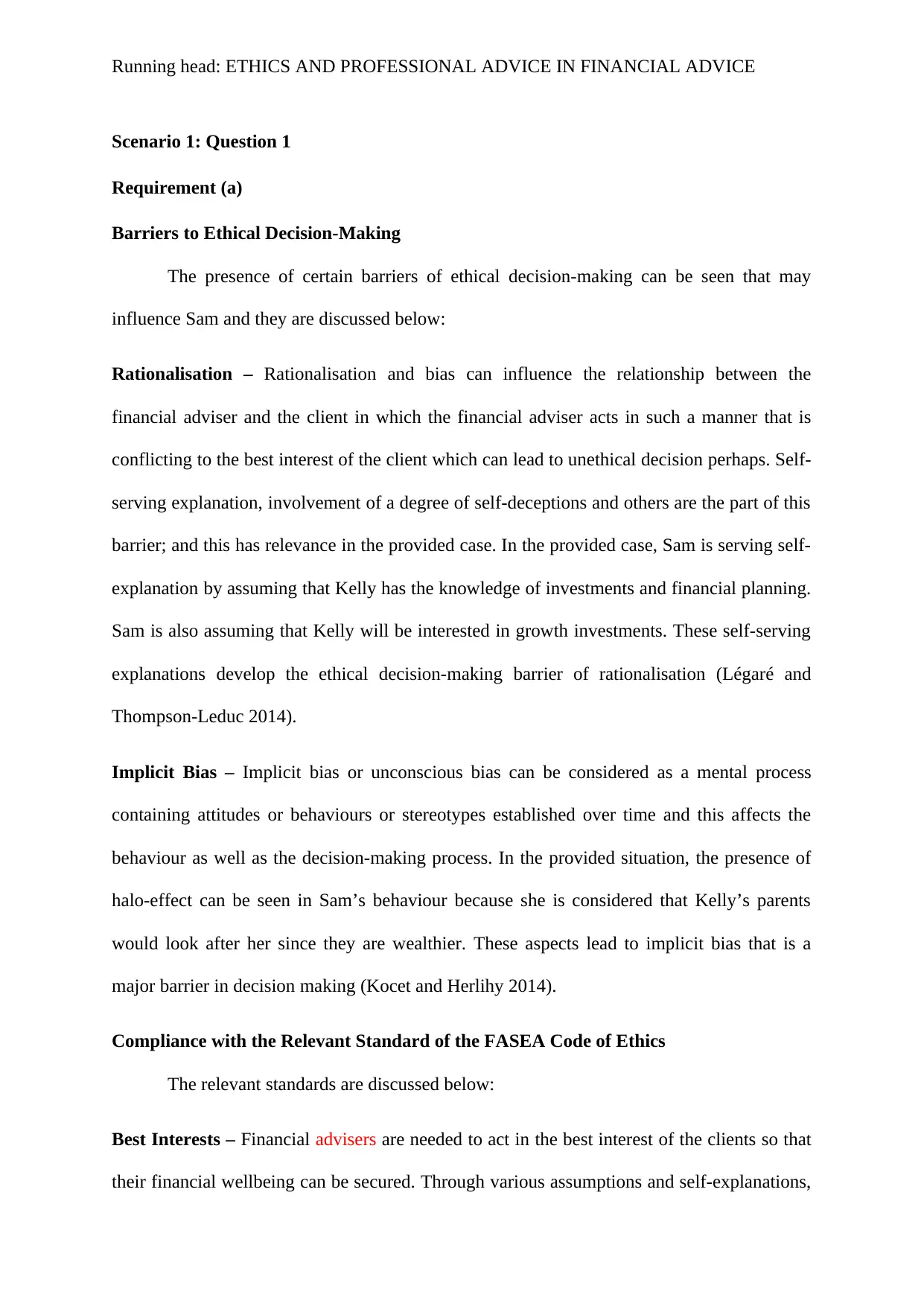
Running head: ETHICS AND PROFESSIONAL ADVICE IN FINANCIAL ADVICE
Scenario 1: Question 1
Requirement (a)
Barriers to Ethical Decision-Making
The presence of certain barriers of ethical decision-making can be seen that may
influence Sam and they are discussed below:
Rationalisation – Rationalisation and bias can influence the relationship between the
financial adviser and the client in which the financial adviser acts in such a manner that is
conflicting to the best interest of the client which can lead to unethical decision perhaps. Self-
serving explanation, involvement of a degree of self-deceptions and others are the part of this
barrier; and this has relevance in the provided case. In the provided case, Sam is serving self-
explanation by assuming that Kelly has the knowledge of investments and financial planning.
Sam is also assuming that Kelly will be interested in growth investments. These self-serving
explanations develop the ethical decision-making barrier of rationalisation (Légaré and
Thompson-Leduc 2014).
Implicit Bias – Implicit bias or unconscious bias can be considered as a mental process
containing attitudes or behaviours or stereotypes established over time and this affects the
behaviour as well as the decision-making process. In the provided situation, the presence of
halo-effect can be seen in Sam’s behaviour because she is considered that Kelly’s parents
would look after her since they are wealthier. These aspects lead to implicit bias that is a
major barrier in decision making (Kocet and Herlihy 2014).
Compliance with the Relevant Standard of the FASEA Code of Ethics
The relevant standards are discussed below:
Best Interests – Financial advisers are needed to act in the best interest of the clients so that
their financial wellbeing can be secured. Through various assumptions and self-explanations,
Scenario 1: Question 1
Requirement (a)
Barriers to Ethical Decision-Making
The presence of certain barriers of ethical decision-making can be seen that may
influence Sam and they are discussed below:
Rationalisation – Rationalisation and bias can influence the relationship between the
financial adviser and the client in which the financial adviser acts in such a manner that is
conflicting to the best interest of the client which can lead to unethical decision perhaps. Self-
serving explanation, involvement of a degree of self-deceptions and others are the part of this
barrier; and this has relevance in the provided case. In the provided case, Sam is serving self-
explanation by assuming that Kelly has the knowledge of investments and financial planning.
Sam is also assuming that Kelly will be interested in growth investments. These self-serving
explanations develop the ethical decision-making barrier of rationalisation (Légaré and
Thompson-Leduc 2014).
Implicit Bias – Implicit bias or unconscious bias can be considered as a mental process
containing attitudes or behaviours or stereotypes established over time and this affects the
behaviour as well as the decision-making process. In the provided situation, the presence of
halo-effect can be seen in Sam’s behaviour because she is considered that Kelly’s parents
would look after her since they are wealthier. These aspects lead to implicit bias that is a
major barrier in decision making (Kocet and Herlihy 2014).
Compliance with the Relevant Standard of the FASEA Code of Ethics
The relevant standards are discussed below:
Best Interests – Financial advisers are needed to act in the best interest of the clients so that
their financial wellbeing can be secured. Through various assumptions and self-explanations,
⊘ This is a preview!⊘
Do you want full access?
Subscribe today to unlock all pages.

Trusted by 1+ million students worldwide
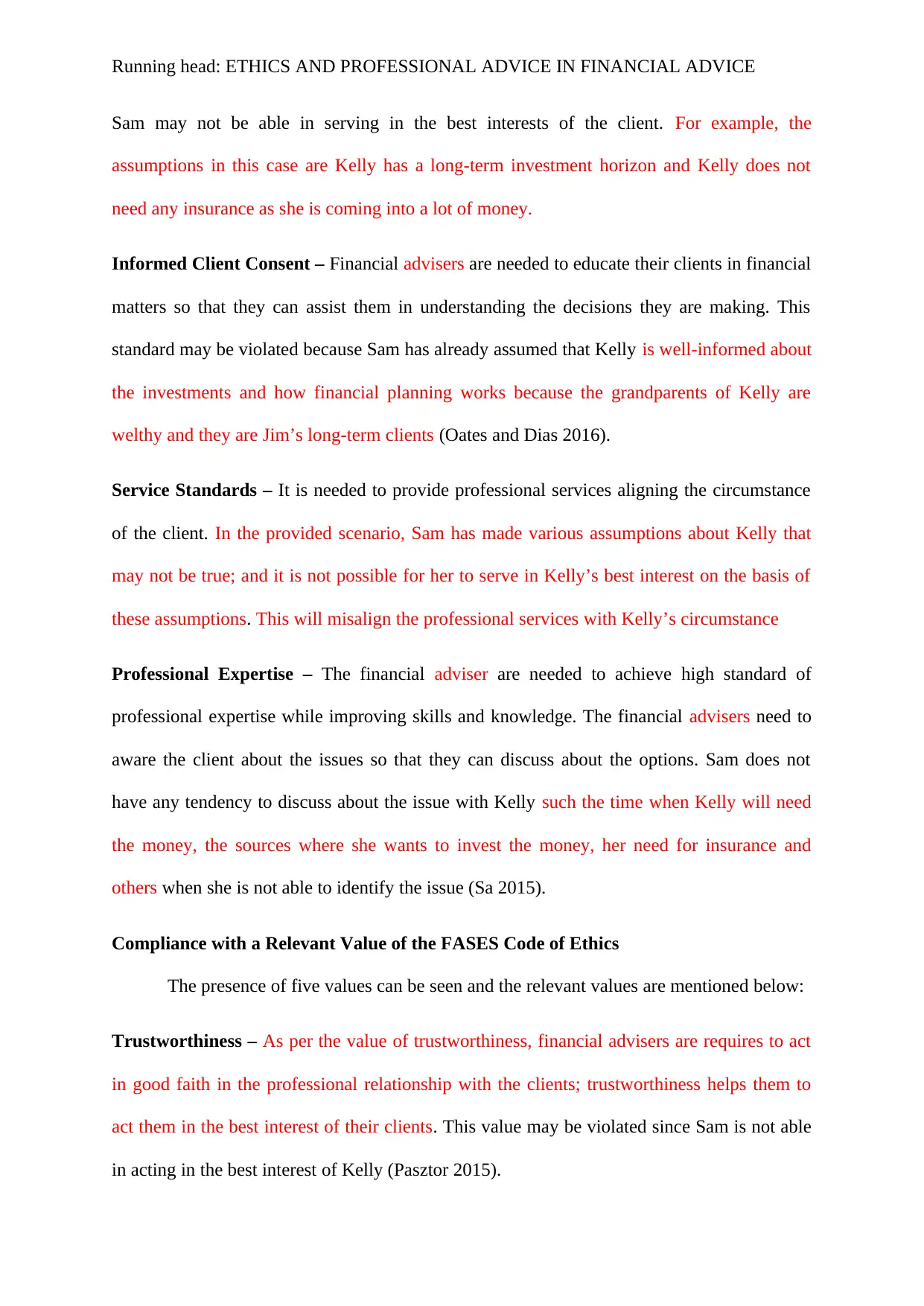
Running head: ETHICS AND PROFESSIONAL ADVICE IN FINANCIAL ADVICE
Sam may not be able in serving in the best interests of the client. For example, the
assumptions in this case are Kelly has a long-term investment horizon and Kelly does not
need any insurance as she is coming into a lot of money.
Informed Client Consent – Financial advisers are needed to educate their clients in financial
matters so that they can assist them in understanding the decisions they are making. This
standard may be violated because Sam has already assumed that Kelly is well-informed about
the investments and how financial planning works because the grandparents of Kelly are
welthy and they are Jim’s long-term clients (Oates and Dias 2016).
Service Standards – It is needed to provide professional services aligning the circumstance
of the client. In the provided scenario, Sam has made various assumptions about Kelly that
may not be true; and it is not possible for her to serve in Kelly’s best interest on the basis of
these assumptions. This will misalign the professional services with Kelly’s circumstance
Professional Expertise – The financial adviser are needed to achieve high standard of
professional expertise while improving skills and knowledge. The financial advisers need to
aware the client about the issues so that they can discuss about the options. Sam does not
have any tendency to discuss about the issue with Kelly such the time when Kelly will need
the money, the sources where she wants to invest the money, her need for insurance and
others when she is not able to identify the issue (Sa 2015).
Compliance with a Relevant Value of the FASES Code of Ethics
The presence of five values can be seen and the relevant values are mentioned below:
Trustworthiness – As per the value of trustworthiness, financial advisers are requires to act
in good faith in the professional relationship with the clients; trustworthiness helps them to
act them in the best interest of their clients. This value may be violated since Sam is not able
in acting in the best interest of Kelly (Pasztor 2015).
Sam may not be able in serving in the best interests of the client. For example, the
assumptions in this case are Kelly has a long-term investment horizon and Kelly does not
need any insurance as she is coming into a lot of money.
Informed Client Consent – Financial advisers are needed to educate their clients in financial
matters so that they can assist them in understanding the decisions they are making. This
standard may be violated because Sam has already assumed that Kelly is well-informed about
the investments and how financial planning works because the grandparents of Kelly are
welthy and they are Jim’s long-term clients (Oates and Dias 2016).
Service Standards – It is needed to provide professional services aligning the circumstance
of the client. In the provided scenario, Sam has made various assumptions about Kelly that
may not be true; and it is not possible for her to serve in Kelly’s best interest on the basis of
these assumptions. This will misalign the professional services with Kelly’s circumstance
Professional Expertise – The financial adviser are needed to achieve high standard of
professional expertise while improving skills and knowledge. The financial advisers need to
aware the client about the issues so that they can discuss about the options. Sam does not
have any tendency to discuss about the issue with Kelly such the time when Kelly will need
the money, the sources where she wants to invest the money, her need for insurance and
others when she is not able to identify the issue (Sa 2015).
Compliance with a Relevant Value of the FASES Code of Ethics
The presence of five values can be seen and the relevant values are mentioned below:
Trustworthiness – As per the value of trustworthiness, financial advisers are requires to act
in good faith in the professional relationship with the clients; trustworthiness helps them to
act them in the best interest of their clients. This value may be violated since Sam is not able
in acting in the best interest of Kelly (Pasztor 2015).
Paraphrase This Document
Need a fresh take? Get an instant paraphrase of this document with our AI Paraphraser
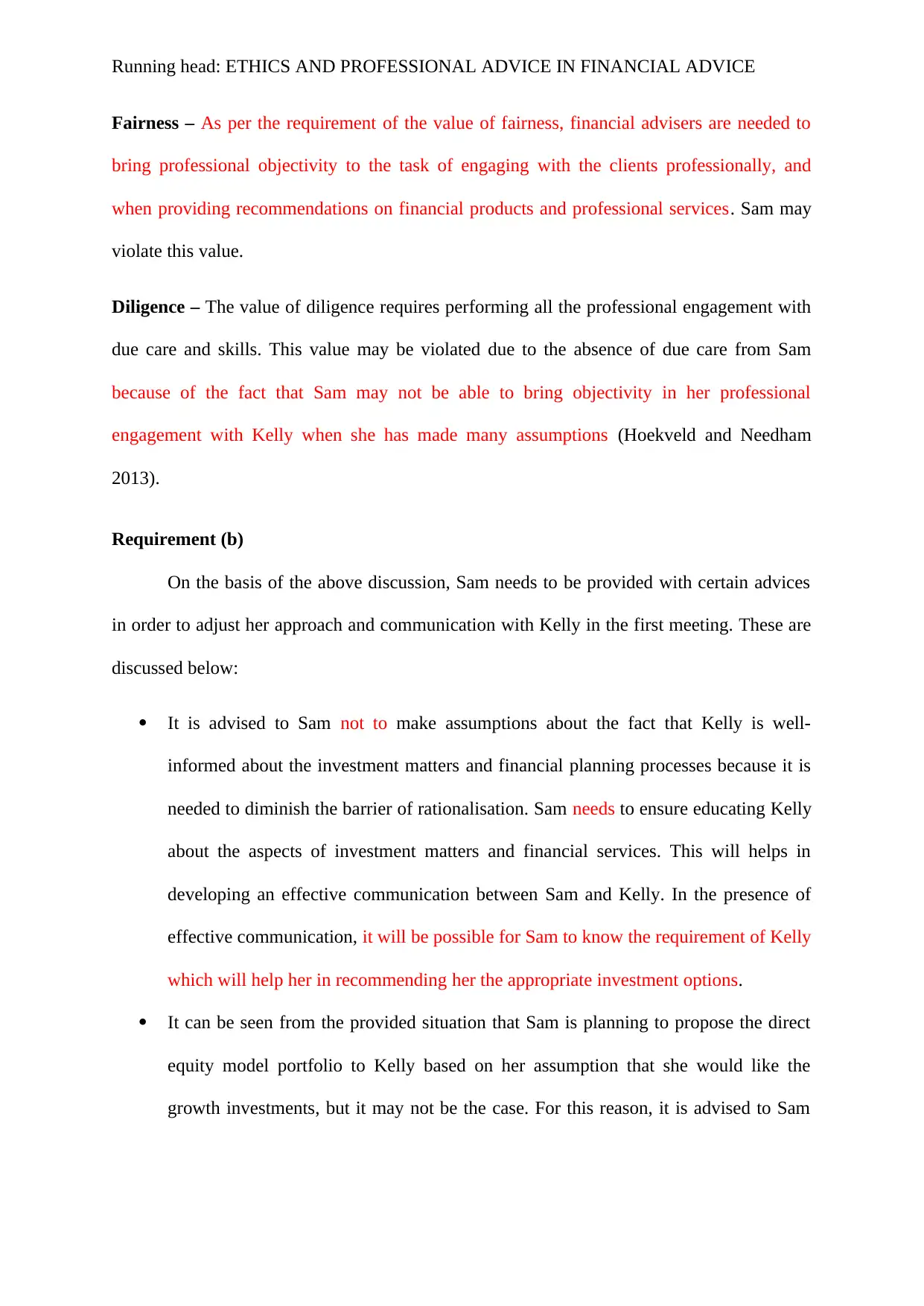
Running head: ETHICS AND PROFESSIONAL ADVICE IN FINANCIAL ADVICE
Fairness – As per the requirement of the value of fairness, financial advisers are needed to
bring professional objectivity to the task of engaging with the clients professionally, and
when providing recommendations on financial products and professional services. Sam may
violate this value.
Diligence – The value of diligence requires performing all the professional engagement with
due care and skills. This value may be violated due to the absence of due care from Sam
because of the fact that Sam may not be able to bring objectivity in her professional
engagement with Kelly when she has made many assumptions (Hoekveld and Needham
2013).
Requirement (b)
On the basis of the above discussion, Sam needs to be provided with certain advices
in order to adjust her approach and communication with Kelly in the first meeting. These are
discussed below:
It is advised to Sam not to make assumptions about the fact that Kelly is well-
informed about the investment matters and financial planning processes because it is
needed to diminish the barrier of rationalisation. Sam needs to ensure educating Kelly
about the aspects of investment matters and financial services. This will helps in
developing an effective communication between Sam and Kelly. In the presence of
effective communication, it will be possible for Sam to know the requirement of Kelly
which will help her in recommending her the appropriate investment options.
It can be seen from the provided situation that Sam is planning to propose the direct
equity model portfolio to Kelly based on her assumption that she would like the
growth investments, but it may not be the case. For this reason, it is advised to Sam
Fairness – As per the requirement of the value of fairness, financial advisers are needed to
bring professional objectivity to the task of engaging with the clients professionally, and
when providing recommendations on financial products and professional services. Sam may
violate this value.
Diligence – The value of diligence requires performing all the professional engagement with
due care and skills. This value may be violated due to the absence of due care from Sam
because of the fact that Sam may not be able to bring objectivity in her professional
engagement with Kelly when she has made many assumptions (Hoekveld and Needham
2013).
Requirement (b)
On the basis of the above discussion, Sam needs to be provided with certain advices
in order to adjust her approach and communication with Kelly in the first meeting. These are
discussed below:
It is advised to Sam not to make assumptions about the fact that Kelly is well-
informed about the investment matters and financial planning processes because it is
needed to diminish the barrier of rationalisation. Sam needs to ensure educating Kelly
about the aspects of investment matters and financial services. This will helps in
developing an effective communication between Sam and Kelly. In the presence of
effective communication, it will be possible for Sam to know the requirement of Kelly
which will help her in recommending her the appropriate investment options.
It can be seen from the provided situation that Sam is planning to propose the direct
equity model portfolio to Kelly based on her assumption that she would like the
growth investments, but it may not be the case. For this reason, it is advised to Sam
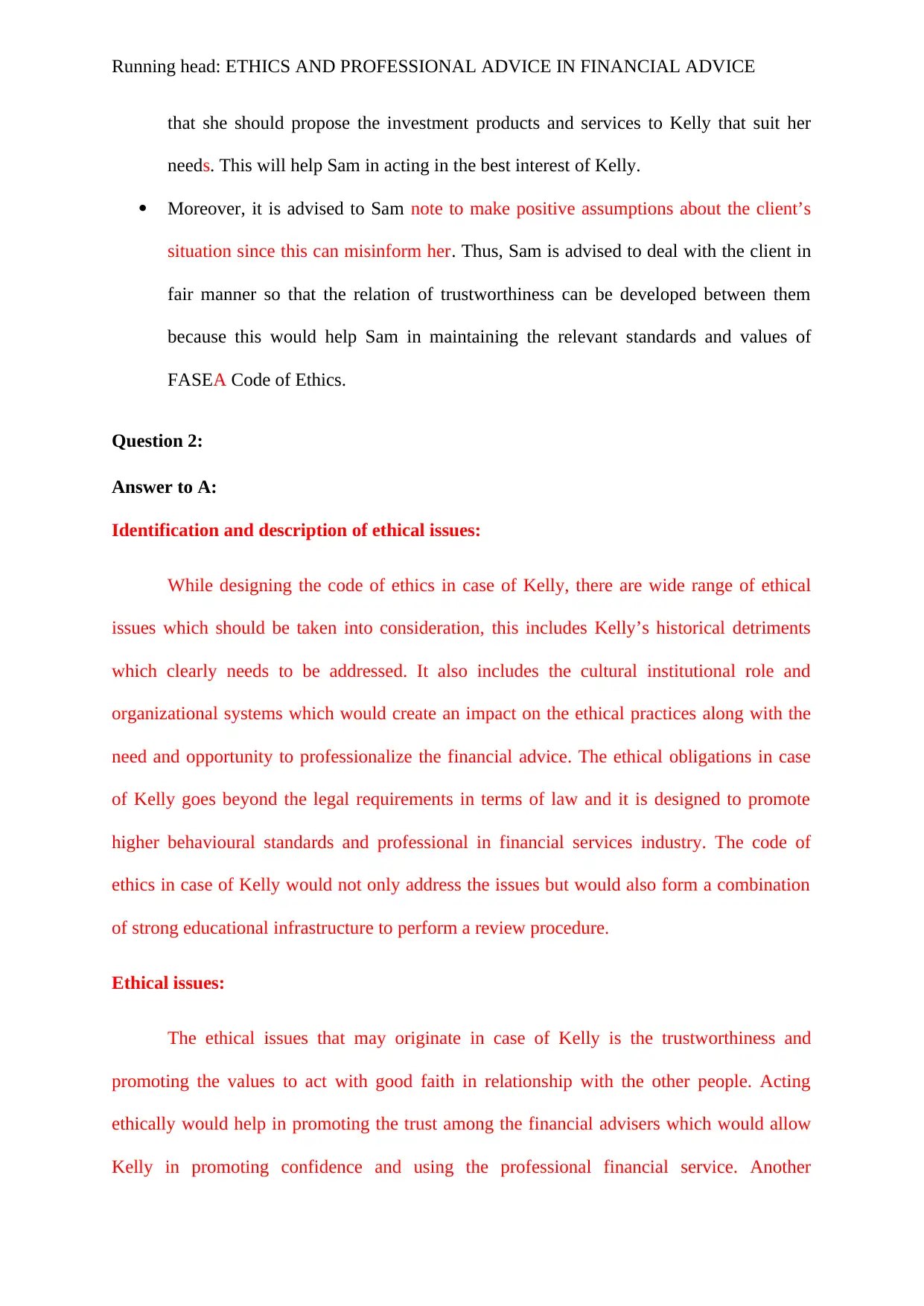
Running head: ETHICS AND PROFESSIONAL ADVICE IN FINANCIAL ADVICE
that she should propose the investment products and services to Kelly that suit her
needs. This will help Sam in acting in the best interest of Kelly.
Moreover, it is advised to Sam note to make positive assumptions about the client’s
situation since this can misinform her. Thus, Sam is advised to deal with the client in
fair manner so that the relation of trustworthiness can be developed between them
because this would help Sam in maintaining the relevant standards and values of
FASEA Code of Ethics.
Question 2:
Answer to A:
Identification and description of ethical issues:
While designing the code of ethics in case of Kelly, there are wide range of ethical
issues which should be taken into consideration, this includes Kelly’s historical detriments
which clearly needs to be addressed. It also includes the cultural institutional role and
organizational systems which would create an impact on the ethical practices along with the
need and opportunity to professionalize the financial advice. The ethical obligations in case
of Kelly goes beyond the legal requirements in terms of law and it is designed to promote
higher behavioural standards and professional in financial services industry. The code of
ethics in case of Kelly would not only address the issues but would also form a combination
of strong educational infrastructure to perform a review procedure.
Ethical issues:
The ethical issues that may originate in case of Kelly is the trustworthiness and
promoting the values to act with good faith in relationship with the other people. Acting
ethically would help in promoting the trust among the financial advisers which would allow
Kelly in promoting confidence and using the professional financial service. Another
that she should propose the investment products and services to Kelly that suit her
needs. This will help Sam in acting in the best interest of Kelly.
Moreover, it is advised to Sam note to make positive assumptions about the client’s
situation since this can misinform her. Thus, Sam is advised to deal with the client in
fair manner so that the relation of trustworthiness can be developed between them
because this would help Sam in maintaining the relevant standards and values of
FASEA Code of Ethics.
Question 2:
Answer to A:
Identification and description of ethical issues:
While designing the code of ethics in case of Kelly, there are wide range of ethical
issues which should be taken into consideration, this includes Kelly’s historical detriments
which clearly needs to be addressed. It also includes the cultural institutional role and
organizational systems which would create an impact on the ethical practices along with the
need and opportunity to professionalize the financial advice. The ethical obligations in case
of Kelly goes beyond the legal requirements in terms of law and it is designed to promote
higher behavioural standards and professional in financial services industry. The code of
ethics in case of Kelly would not only address the issues but would also form a combination
of strong educational infrastructure to perform a review procedure.
Ethical issues:
The ethical issues that may originate in case of Kelly is the trustworthiness and
promoting the values to act with good faith in relationship with the other people. Acting
ethically would help in promoting the trust among the financial advisers which would allow
Kelly in promoting confidence and using the professional financial service. Another
⊘ This is a preview!⊘
Do you want full access?
Subscribe today to unlock all pages.

Trusted by 1+ million students worldwide
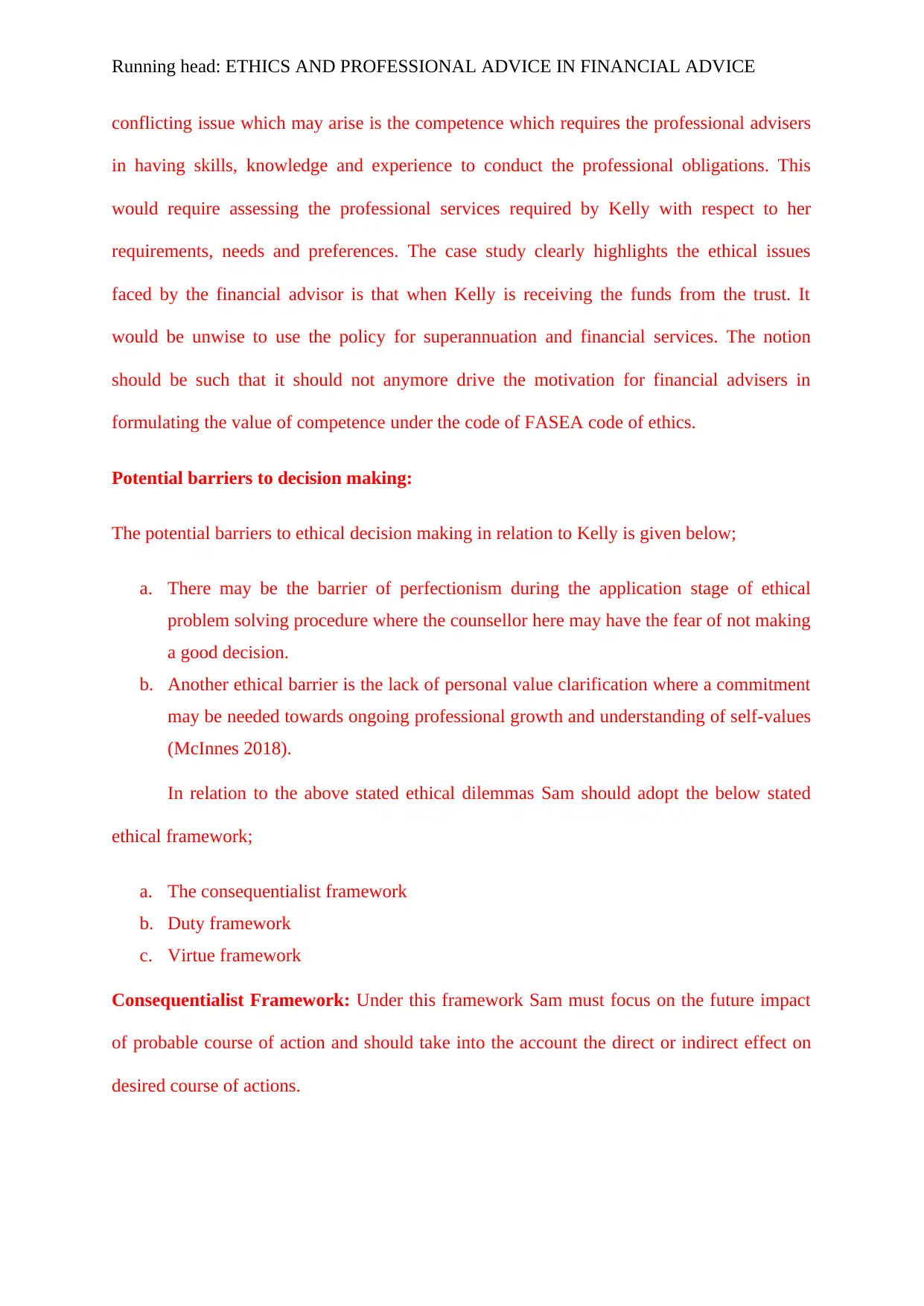
Running head: ETHICS AND PROFESSIONAL ADVICE IN FINANCIAL ADVICE
conflicting issue which may arise is the competence which requires the professional advisers
in having skills, knowledge and experience to conduct the professional obligations. This
would require assessing the professional services required by Kelly with respect to her
requirements, needs and preferences. The case study clearly highlights the ethical issues
faced by the financial advisor is that when Kelly is receiving the funds from the trust. It
would be unwise to use the policy for superannuation and financial services. The notion
should be such that it should not anymore drive the motivation for financial advisers in
formulating the value of competence under the code of FASEA code of ethics.
Potential barriers to decision making:
The potential barriers to ethical decision making in relation to Kelly is given below;
a. There may be the barrier of perfectionism during the application stage of ethical
problem solving procedure where the counsellor here may have the fear of not making
a good decision.
b. Another ethical barrier is the lack of personal value clarification where a commitment
may be needed towards ongoing professional growth and understanding of self-values
(McInnes 2018).
In relation to the above stated ethical dilemmas Sam should adopt the below stated
ethical framework;
a. The consequentialist framework
b. Duty framework
c. Virtue framework
Consequentialist Framework: Under this framework Sam must focus on the future impact
of probable course of action and should take into the account the direct or indirect effect on
desired course of actions.
conflicting issue which may arise is the competence which requires the professional advisers
in having skills, knowledge and experience to conduct the professional obligations. This
would require assessing the professional services required by Kelly with respect to her
requirements, needs and preferences. The case study clearly highlights the ethical issues
faced by the financial advisor is that when Kelly is receiving the funds from the trust. It
would be unwise to use the policy for superannuation and financial services. The notion
should be such that it should not anymore drive the motivation for financial advisers in
formulating the value of competence under the code of FASEA code of ethics.
Potential barriers to decision making:
The potential barriers to ethical decision making in relation to Kelly is given below;
a. There may be the barrier of perfectionism during the application stage of ethical
problem solving procedure where the counsellor here may have the fear of not making
a good decision.
b. Another ethical barrier is the lack of personal value clarification where a commitment
may be needed towards ongoing professional growth and understanding of self-values
(McInnes 2018).
In relation to the above stated ethical dilemmas Sam should adopt the below stated
ethical framework;
a. The consequentialist framework
b. Duty framework
c. Virtue framework
Consequentialist Framework: Under this framework Sam must focus on the future impact
of probable course of action and should take into the account the direct or indirect effect on
desired course of actions.
Paraphrase This Document
Need a fresh take? Get an instant paraphrase of this document with our AI Paraphraser
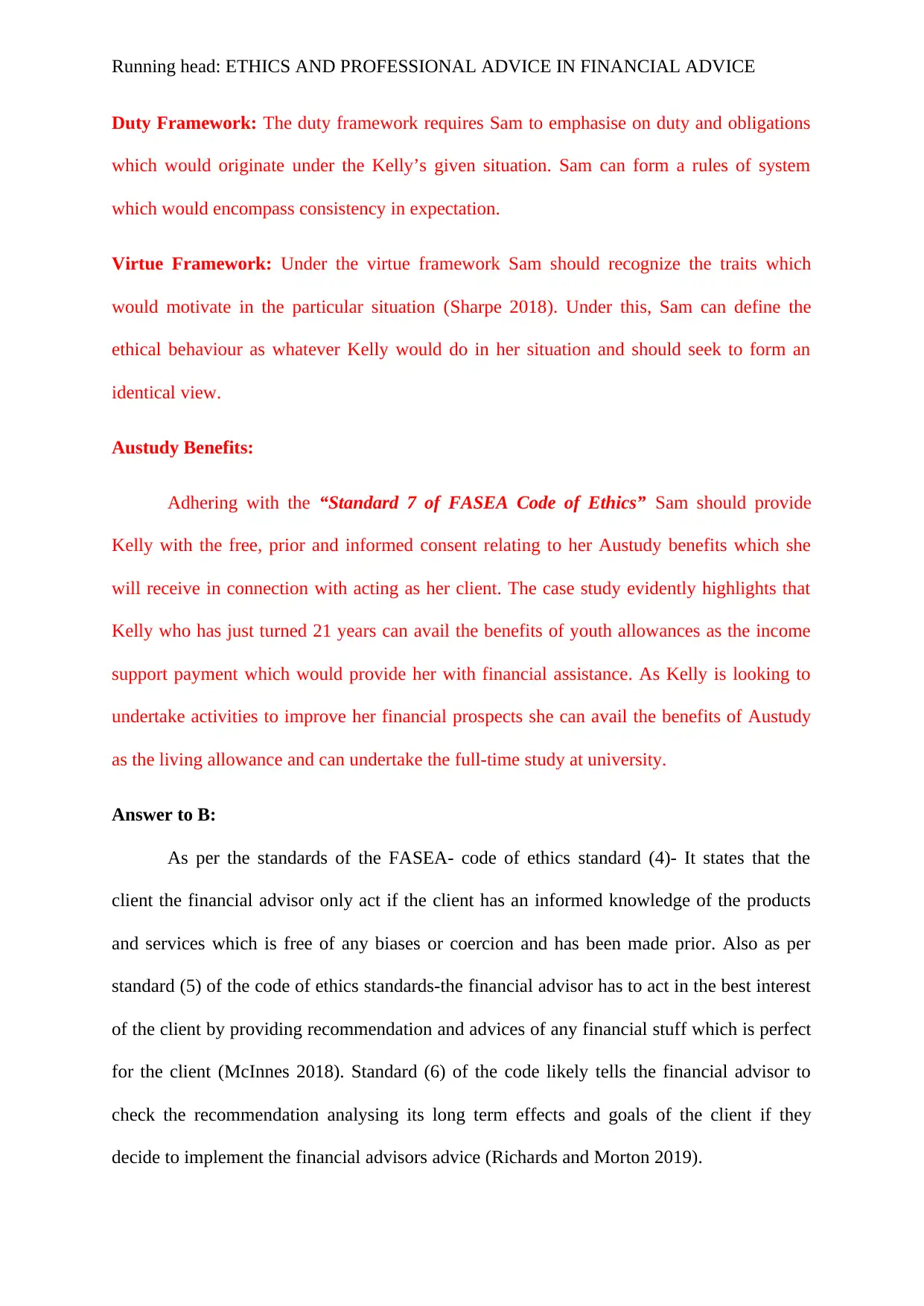
Running head: ETHICS AND PROFESSIONAL ADVICE IN FINANCIAL ADVICE
Duty Framework: The duty framework requires Sam to emphasise on duty and obligations
which would originate under the Kelly’s given situation. Sam can form a rules of system
which would encompass consistency in expectation.
Virtue Framework: Under the virtue framework Sam should recognize the traits which
would motivate in the particular situation (Sharpe 2018). Under this, Sam can define the
ethical behaviour as whatever Kelly would do in her situation and should seek to form an
identical view.
Austudy Benefits:
Adhering with the “Standard 7 of FASEA Code of Ethics” Sam should provide
Kelly with the free, prior and informed consent relating to her Austudy benefits which she
will receive in connection with acting as her client. The case study evidently highlights that
Kelly who has just turned 21 years can avail the benefits of youth allowances as the income
support payment which would provide her with financial assistance. As Kelly is looking to
undertake activities to improve her financial prospects she can avail the benefits of Austudy
as the living allowance and can undertake the full-time study at university.
Answer to B:
As per the standards of the FASEA- code of ethics standard (4)- It states that the
client the financial advisor only act if the client has an informed knowledge of the products
and services which is free of any biases or coercion and has been made prior. Also as per
standard (5) of the code of ethics standards-the financial advisor has to act in the best interest
of the client by providing recommendation and advices of any financial stuff which is perfect
for the client (McInnes 2018). Standard (6) of the code likely tells the financial advisor to
check the recommendation analysing its long term effects and goals of the client if they
decide to implement the financial advisors advice (Richards and Morton 2019).
Duty Framework: The duty framework requires Sam to emphasise on duty and obligations
which would originate under the Kelly’s given situation. Sam can form a rules of system
which would encompass consistency in expectation.
Virtue Framework: Under the virtue framework Sam should recognize the traits which
would motivate in the particular situation (Sharpe 2018). Under this, Sam can define the
ethical behaviour as whatever Kelly would do in her situation and should seek to form an
identical view.
Austudy Benefits:
Adhering with the “Standard 7 of FASEA Code of Ethics” Sam should provide
Kelly with the free, prior and informed consent relating to her Austudy benefits which she
will receive in connection with acting as her client. The case study evidently highlights that
Kelly who has just turned 21 years can avail the benefits of youth allowances as the income
support payment which would provide her with financial assistance. As Kelly is looking to
undertake activities to improve her financial prospects she can avail the benefits of Austudy
as the living allowance and can undertake the full-time study at university.
Answer to B:
As per the standards of the FASEA- code of ethics standard (4)- It states that the
client the financial advisor only act if the client has an informed knowledge of the products
and services which is free of any biases or coercion and has been made prior. Also as per
standard (5) of the code of ethics standards-the financial advisor has to act in the best interest
of the client by providing recommendation and advices of any financial stuff which is perfect
for the client (McInnes 2018). Standard (6) of the code likely tells the financial advisor to
check the recommendation analysing its long term effects and goals of the client if they
decide to implement the financial advisors advice (Richards and Morton 2019).
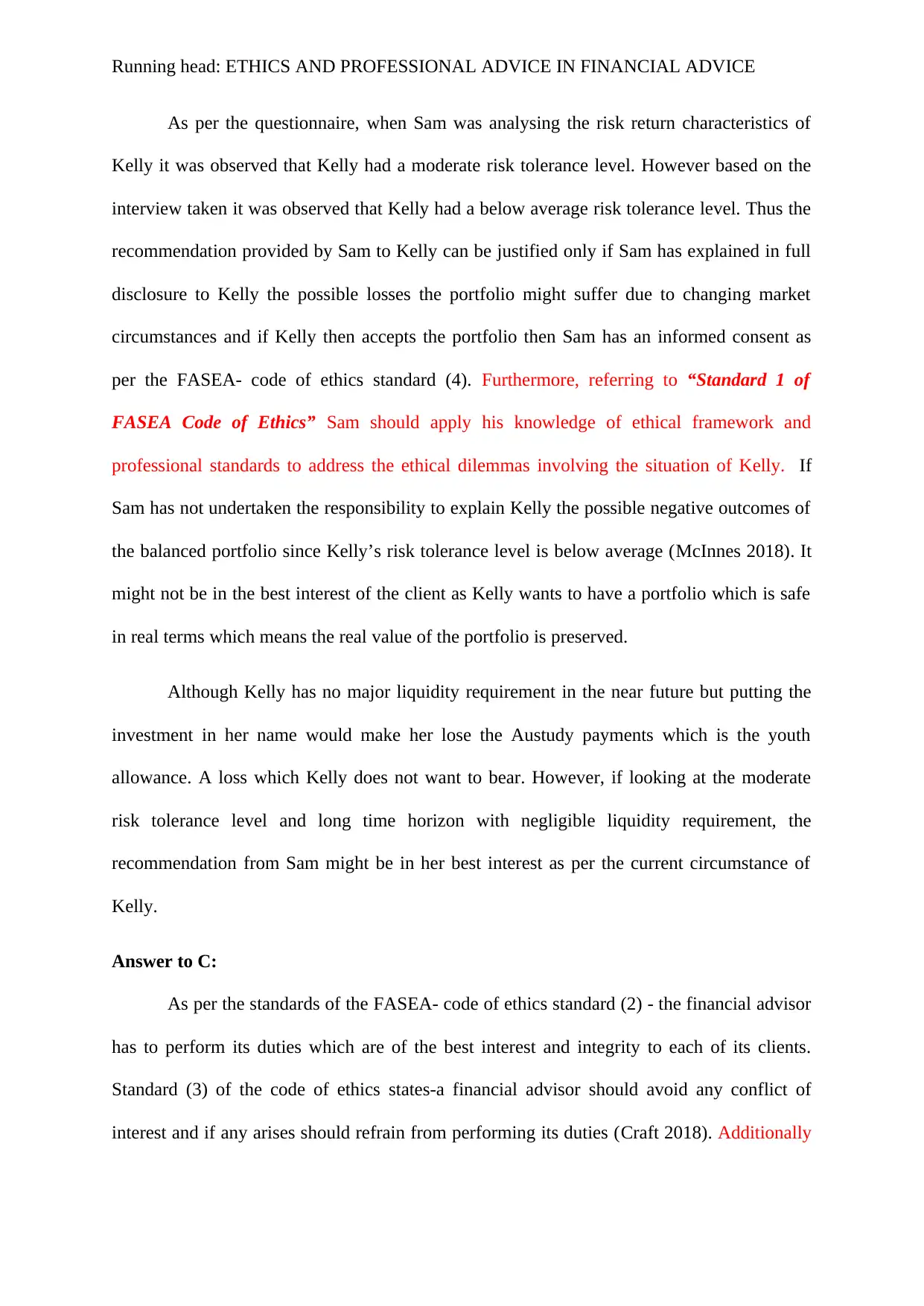
Running head: ETHICS AND PROFESSIONAL ADVICE IN FINANCIAL ADVICE
As per the questionnaire, when Sam was analysing the risk return characteristics of
Kelly it was observed that Kelly had a moderate risk tolerance level. However based on the
interview taken it was observed that Kelly had a below average risk tolerance level. Thus the
recommendation provided by Sam to Kelly can be justified only if Sam has explained in full
disclosure to Kelly the possible losses the portfolio might suffer due to changing market
circumstances and if Kelly then accepts the portfolio then Sam has an informed consent as
per the FASEA- code of ethics standard (4). Furthermore, referring to “Standard 1 of
FASEA Code of Ethics” Sam should apply his knowledge of ethical framework and
professional standards to address the ethical dilemmas involving the situation of Kelly. If
Sam has not undertaken the responsibility to explain Kelly the possible negative outcomes of
the balanced portfolio since Kelly’s risk tolerance level is below average (McInnes 2018). It
might not be in the best interest of the client as Kelly wants to have a portfolio which is safe
in real terms which means the real value of the portfolio is preserved.
Although Kelly has no major liquidity requirement in the near future but putting the
investment in her name would make her lose the Austudy payments which is the youth
allowance. A loss which Kelly does not want to bear. However, if looking at the moderate
risk tolerance level and long time horizon with negligible liquidity requirement, the
recommendation from Sam might be in her best interest as per the current circumstance of
Kelly.
Answer to C:
As per the standards of the FASEA- code of ethics standard (2) - the financial advisor
has to perform its duties which are of the best interest and integrity to each of its clients.
Standard (3) of the code of ethics states-a financial advisor should avoid any conflict of
interest and if any arises should refrain from performing its duties (Craft 2018). Additionally
As per the questionnaire, when Sam was analysing the risk return characteristics of
Kelly it was observed that Kelly had a moderate risk tolerance level. However based on the
interview taken it was observed that Kelly had a below average risk tolerance level. Thus the
recommendation provided by Sam to Kelly can be justified only if Sam has explained in full
disclosure to Kelly the possible losses the portfolio might suffer due to changing market
circumstances and if Kelly then accepts the portfolio then Sam has an informed consent as
per the FASEA- code of ethics standard (4). Furthermore, referring to “Standard 1 of
FASEA Code of Ethics” Sam should apply his knowledge of ethical framework and
professional standards to address the ethical dilemmas involving the situation of Kelly. If
Sam has not undertaken the responsibility to explain Kelly the possible negative outcomes of
the balanced portfolio since Kelly’s risk tolerance level is below average (McInnes 2018). It
might not be in the best interest of the client as Kelly wants to have a portfolio which is safe
in real terms which means the real value of the portfolio is preserved.
Although Kelly has no major liquidity requirement in the near future but putting the
investment in her name would make her lose the Austudy payments which is the youth
allowance. A loss which Kelly does not want to bear. However, if looking at the moderate
risk tolerance level and long time horizon with negligible liquidity requirement, the
recommendation from Sam might be in her best interest as per the current circumstance of
Kelly.
Answer to C:
As per the standards of the FASEA- code of ethics standard (2) - the financial advisor
has to perform its duties which are of the best interest and integrity to each of its clients.
Standard (3) of the code of ethics states-a financial advisor should avoid any conflict of
interest and if any arises should refrain from performing its duties (Craft 2018). Additionally
⊘ This is a preview!⊘
Do you want full access?
Subscribe today to unlock all pages.

Trusted by 1+ million students worldwide
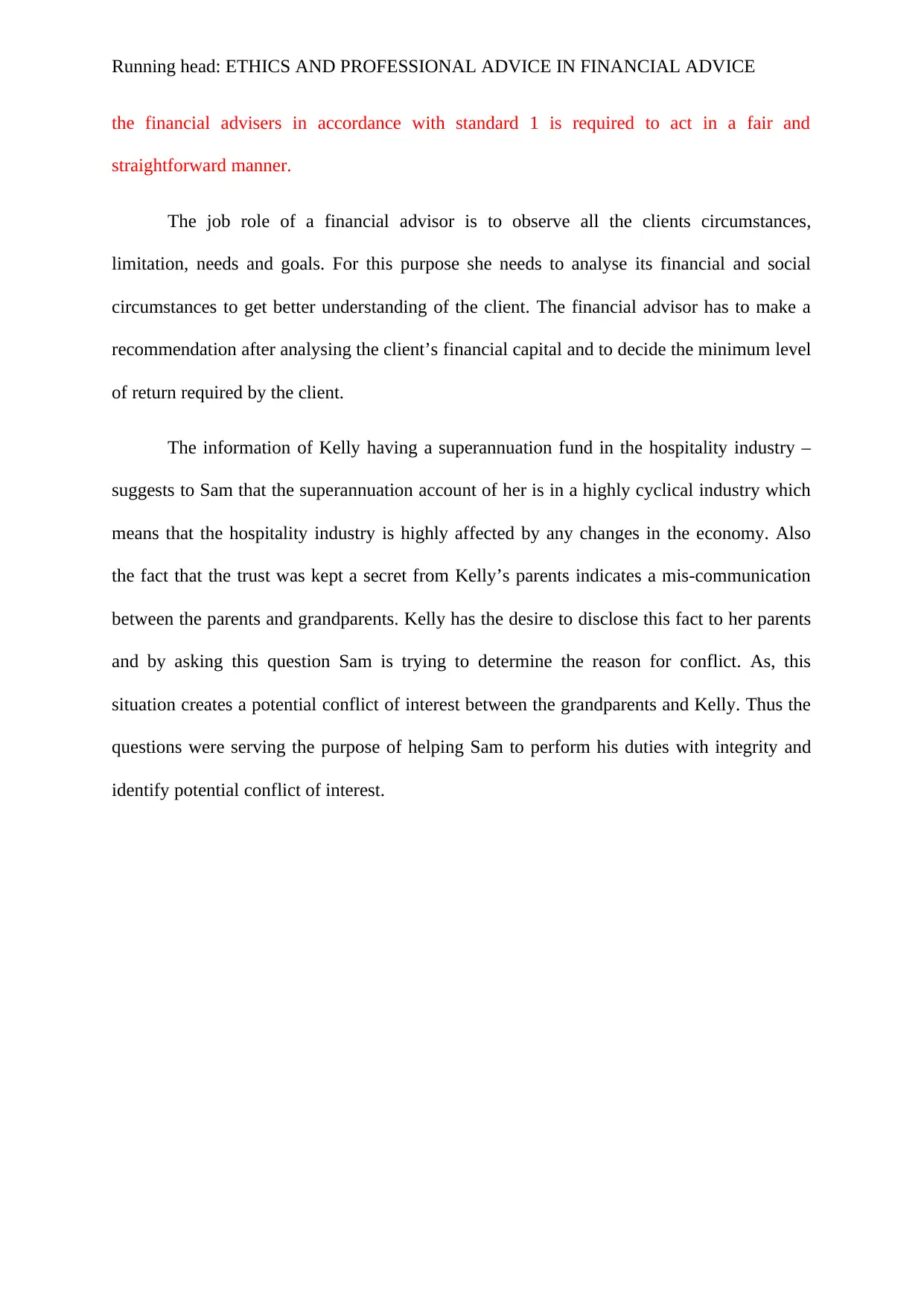
Running head: ETHICS AND PROFESSIONAL ADVICE IN FINANCIAL ADVICE
the financial advisers in accordance with standard 1 is required to act in a fair and
straightforward manner.
The job role of a financial advisor is to observe all the clients circumstances,
limitation, needs and goals. For this purpose she needs to analyse its financial and social
circumstances to get better understanding of the client. The financial advisor has to make a
recommendation after analysing the client’s financial capital and to decide the minimum level
of return required by the client.
The information of Kelly having a superannuation fund in the hospitality industry –
suggests to Sam that the superannuation account of her is in a highly cyclical industry which
means that the hospitality industry is highly affected by any changes in the economy. Also
the fact that the trust was kept a secret from Kelly’s parents indicates a mis-communication
between the parents and grandparents. Kelly has the desire to disclose this fact to her parents
and by asking this question Sam is trying to determine the reason for conflict. As, this
situation creates a potential conflict of interest between the grandparents and Kelly. Thus the
questions were serving the purpose of helping Sam to perform his duties with integrity and
identify potential conflict of interest.
the financial advisers in accordance with standard 1 is required to act in a fair and
straightforward manner.
The job role of a financial advisor is to observe all the clients circumstances,
limitation, needs and goals. For this purpose she needs to analyse its financial and social
circumstances to get better understanding of the client. The financial advisor has to make a
recommendation after analysing the client’s financial capital and to decide the minimum level
of return required by the client.
The information of Kelly having a superannuation fund in the hospitality industry –
suggests to Sam that the superannuation account of her is in a highly cyclical industry which
means that the hospitality industry is highly affected by any changes in the economy. Also
the fact that the trust was kept a secret from Kelly’s parents indicates a mis-communication
between the parents and grandparents. Kelly has the desire to disclose this fact to her parents
and by asking this question Sam is trying to determine the reason for conflict. As, this
situation creates a potential conflict of interest between the grandparents and Kelly. Thus the
questions were serving the purpose of helping Sam to perform his duties with integrity and
identify potential conflict of interest.
Paraphrase This Document
Need a fresh take? Get an instant paraphrase of this document with our AI Paraphraser
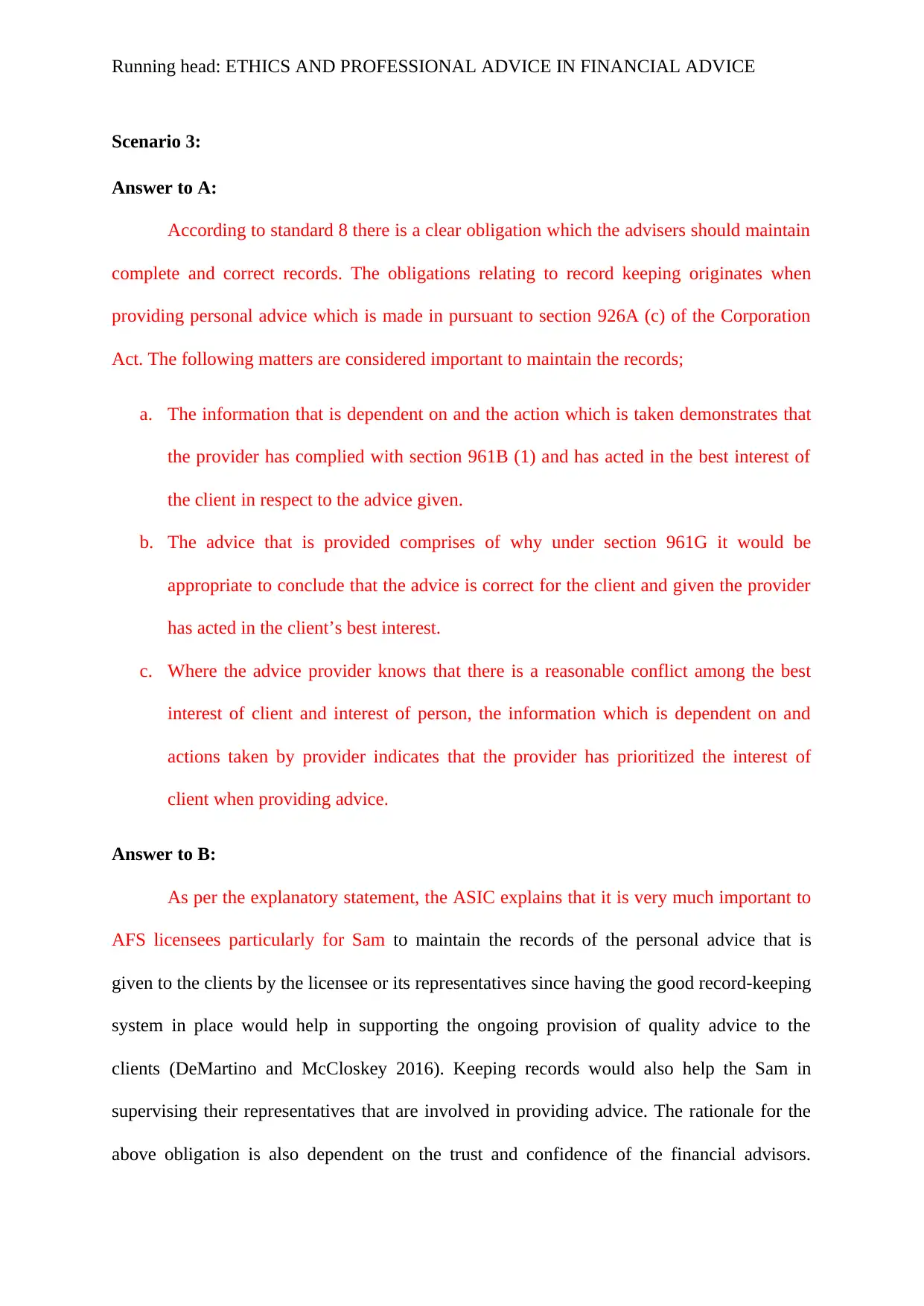
Running head: ETHICS AND PROFESSIONAL ADVICE IN FINANCIAL ADVICE
Scenario 3:
Answer to A:
According to standard 8 there is a clear obligation which the advisers should maintain
complete and correct records. The obligations relating to record keeping originates when
providing personal advice which is made in pursuant to section 926A (c) of the Corporation
Act. The following matters are considered important to maintain the records;
a. The information that is dependent on and the action which is taken demonstrates that
the provider has complied with section 961B (1) and has acted in the best interest of
the client in respect to the advice given.
b. The advice that is provided comprises of why under section 961G it would be
appropriate to conclude that the advice is correct for the client and given the provider
has acted in the client’s best interest.
c. Where the advice provider knows that there is a reasonable conflict among the best
interest of client and interest of person, the information which is dependent on and
actions taken by provider indicates that the provider has prioritized the interest of
client when providing advice.
Answer to B:
As per the explanatory statement, the ASIC explains that it is very much important to
AFS licensees particularly for Sam to maintain the records of the personal advice that is
given to the clients by the licensee or its representatives since having the good record-keeping
system in place would help in supporting the ongoing provision of quality advice to the
clients (DeMartino and McCloskey 2016). Keeping records would also help the Sam in
supervising their representatives that are involved in providing advice. The rationale for the
above obligation is also dependent on the trust and confidence of the financial advisors.
Scenario 3:
Answer to A:
According to standard 8 there is a clear obligation which the advisers should maintain
complete and correct records. The obligations relating to record keeping originates when
providing personal advice which is made in pursuant to section 926A (c) of the Corporation
Act. The following matters are considered important to maintain the records;
a. The information that is dependent on and the action which is taken demonstrates that
the provider has complied with section 961B (1) and has acted in the best interest of
the client in respect to the advice given.
b. The advice that is provided comprises of why under section 961G it would be
appropriate to conclude that the advice is correct for the client and given the provider
has acted in the client’s best interest.
c. Where the advice provider knows that there is a reasonable conflict among the best
interest of client and interest of person, the information which is dependent on and
actions taken by provider indicates that the provider has prioritized the interest of
client when providing advice.
Answer to B:
As per the explanatory statement, the ASIC explains that it is very much important to
AFS licensees particularly for Sam to maintain the records of the personal advice that is
given to the clients by the licensee or its representatives since having the good record-keeping
system in place would help in supporting the ongoing provision of quality advice to the
clients (DeMartino and McCloskey 2016). Keeping records would also help the Sam in
supervising their representatives that are involved in providing advice. The rationale for the
above obligation is also dependent on the trust and confidence of the financial advisors.
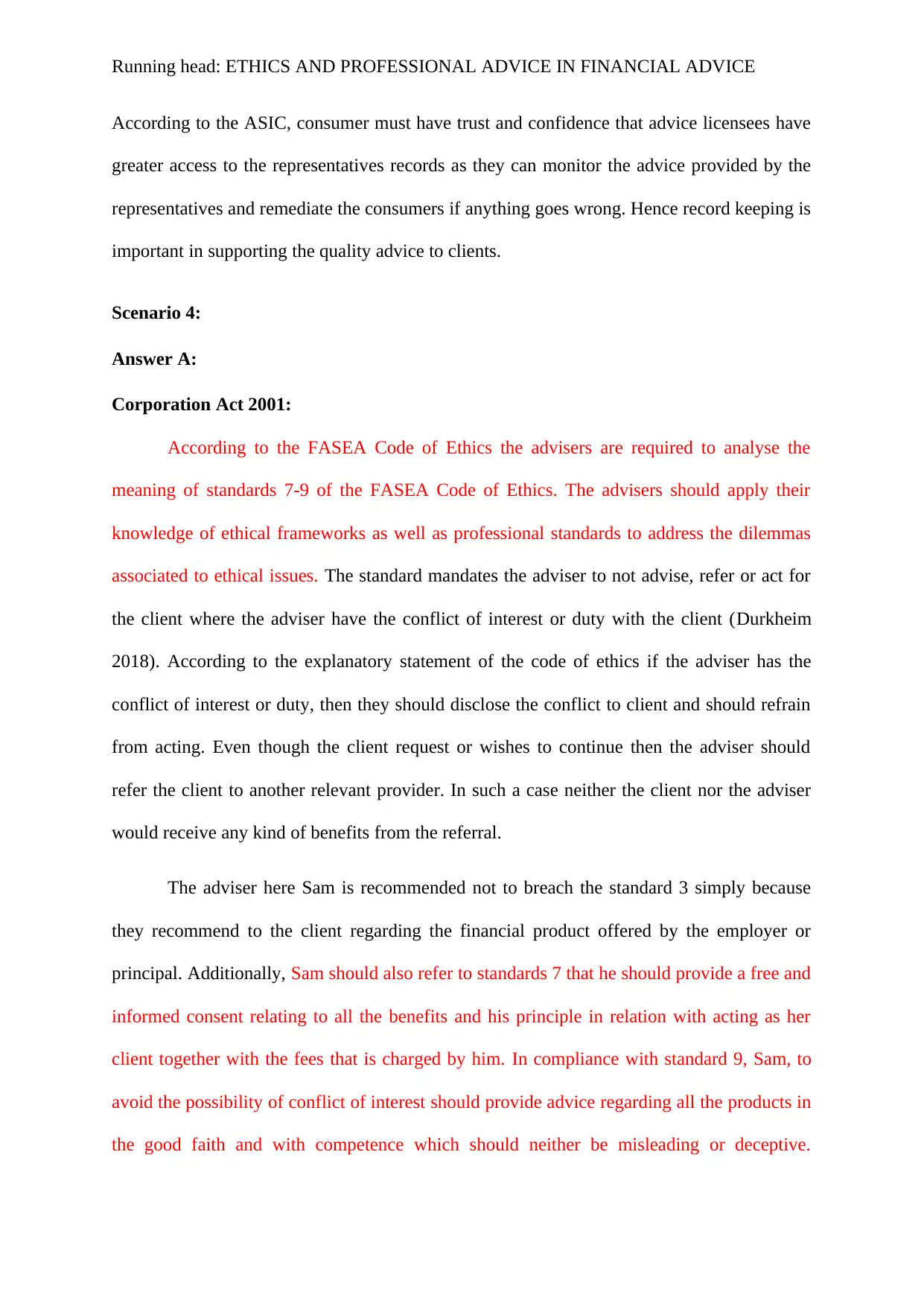
Running head: ETHICS AND PROFESSIONAL ADVICE IN FINANCIAL ADVICE
According to the ASIC, consumer must have trust and confidence that advice licensees have
greater access to the representatives records as they can monitor the advice provided by the
representatives and remediate the consumers if anything goes wrong. Hence record keeping is
important in supporting the quality advice to clients.
Scenario 4:
Answer A:
Corporation Act 2001:
According to the FASEA Code of Ethics the advisers are required to analyse the
meaning of standards 7-9 of the FASEA Code of Ethics. The advisers should apply their
knowledge of ethical frameworks as well as professional standards to address the dilemmas
associated to ethical issues. The standard mandates the adviser to not advise, refer or act for
the client where the adviser have the conflict of interest or duty with the client (Durkheim
2018). According to the explanatory statement of the code of ethics if the adviser has the
conflict of interest or duty, then they should disclose the conflict to client and should refrain
from acting. Even though the client request or wishes to continue then the adviser should
refer the client to another relevant provider. In such a case neither the client nor the adviser
would receive any kind of benefits from the referral.
The adviser here Sam is recommended not to breach the standard 3 simply because
they recommend to the client regarding the financial product offered by the employer or
principal. Additionally, Sam should also refer to standards 7 that he should provide a free and
informed consent relating to all the benefits and his principle in relation with acting as her
client together with the fees that is charged by him. In compliance with standard 9, Sam, to
avoid the possibility of conflict of interest should provide advice regarding all the products in
the good faith and with competence which should neither be misleading or deceptive.
According to the ASIC, consumer must have trust and confidence that advice licensees have
greater access to the representatives records as they can monitor the advice provided by the
representatives and remediate the consumers if anything goes wrong. Hence record keeping is
important in supporting the quality advice to clients.
Scenario 4:
Answer A:
Corporation Act 2001:
According to the FASEA Code of Ethics the advisers are required to analyse the
meaning of standards 7-9 of the FASEA Code of Ethics. The advisers should apply their
knowledge of ethical frameworks as well as professional standards to address the dilemmas
associated to ethical issues. The standard mandates the adviser to not advise, refer or act for
the client where the adviser have the conflict of interest or duty with the client (Durkheim
2018). According to the explanatory statement of the code of ethics if the adviser has the
conflict of interest or duty, then they should disclose the conflict to client and should refrain
from acting. Even though the client request or wishes to continue then the adviser should
refer the client to another relevant provider. In such a case neither the client nor the adviser
would receive any kind of benefits from the referral.
The adviser here Sam is recommended not to breach the standard 3 simply because
they recommend to the client regarding the financial product offered by the employer or
principal. Additionally, Sam should also refer to standards 7 that he should provide a free and
informed consent relating to all the benefits and his principle in relation with acting as her
client together with the fees that is charged by him. In compliance with standard 9, Sam, to
avoid the possibility of conflict of interest should provide advice regarding all the products in
the good faith and with competence which should neither be misleading or deceptive.
⊘ This is a preview!⊘
Do you want full access?
Subscribe today to unlock all pages.

Trusted by 1+ million students worldwide
1 out of 17
Related Documents
Your All-in-One AI-Powered Toolkit for Academic Success.
+13062052269
info@desklib.com
Available 24*7 on WhatsApp / Email
![[object Object]](/_next/static/media/star-bottom.7253800d.svg)
Unlock your academic potential
Copyright © 2020–2026 A2Z Services. All Rights Reserved. Developed and managed by ZUCOL.



